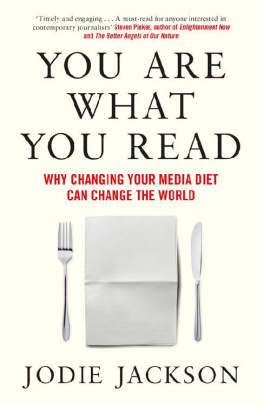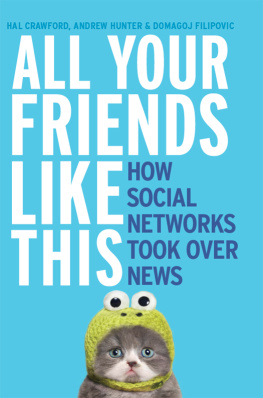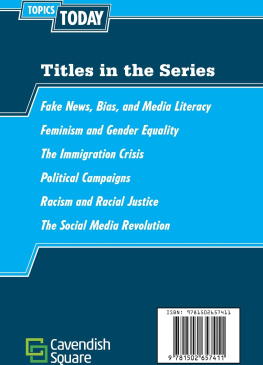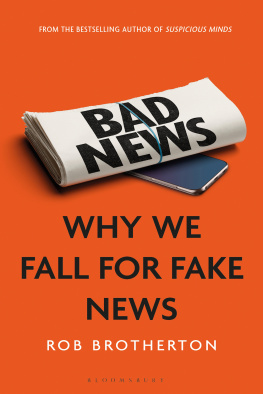
This book is dedicated to all those who not only see the good in the world but contribute to making more of it
A man is but the product of his thoughts; what he thinks, he becomes.
Gandhi
CONTENTS
FOREWORD
There is no more important time than now to rethink news coverage and consumption. As a former journalist, I know better than to start this foreword with such an obvious statement. But what sounds obvious to you and me may not be so for many people. If youve picked up this book you know that there is a better way to stay informed about whats happening in the world or in your community without getting depressed. Perhaps youre looking for strategies or answers, or maybe youre in search of validation for some of the approaches youve adopted to protect your heart and mind amidst rampant negativity on the news. Whatever the reason, this brilliant book by Jodie Jackson is filled with insights and tools that will help you navigate the uncharted territory weve all found ourselves in.
Modern life calls for new operating instructions. These days our brains are being inundated with negative messages that have a direct effect on our well-being. A barrage of negative news increases our anxiety, makes us more fearful, and decreases our performance at work and in school. Depression rates have skyrocketed over the past few decades, and new research finds that eight-year-olds attempting suicide has doubled in recent years. These are just some of the heartbreaking indicators that something is very wrong. At the centre of this broken picture is the media perpetuating a damaging and misguided view of our world and ourselves.
During the Great Recession in America, I saw first-hand how powerful it can be to shift the focus of news coverage and witnessed the impact this has on improving the trajectory of peoples lives. I was anchoring two national news programmes in the United States at CBS News, and like other news organisations, we packed our show with heart-wrenching stories of all that was broken in this world. It was no surprise that this came at the same time we saw an overall decline in viewership as people turned away from these depressing newscasts.
At the height of the recession, my producers and I decided to try something novel an experiment of sorts. Instead of merely showcasing people losing their homes, jobs and retirement savings, we decided to dedicate one week of programming to focus on what people in those situations could do about it. Experts shared actionable strategies to help people avoid financial pitfalls and rebuild their lives. Happy Week got the greatest viewer response of the year, as people shared beautiful stories of how they had used the tools. Focusing on solutions inspired people to take meaningful action.
The lens through which we view the world changes how we operate in it. If we believe the world is dangerous and failing, we hide in our homes and think happiness and success are zero-sum. If we can have a clear understanding of the challenges we face and at the same time maintain a belief that our behaviour matters, we know that the problem is just the start of the story.
Jodie Jackson is the ideal expert to guide us to a better reality. I have learned so much from her, and I know you will too. Jodie and I met during our early years as researchers both investigating the impact of our news diet on well-being and performance. As a quantitative researcher crunching numbers and looking for trends in the data, I was inspired by Jodies qualitative approach, which hit straight to the emotional core. Through her work, she showed me the psychological implications of solutions journalism and taught me so much about how the news affects real people. Weve since collaborated on studies together, along with the Solutions Journalism Network, and additionally weve become friends.
And it was as friends that this work became even more meaningful. We witnessed each other becoming mothers, and we talked not just about the world we wish to create for our children, but the world we wish our children could see exists right now. We want them to always have a resilient mindset that is solutions-focused when challenges strike, and see the potential for positive change in every moment.
And its because of this wish, not just for our children but for us all, that I am so grateful to you for reading this book. As youll quickly see when you dive into You Are What You Read , this is not merely a book, it is a manifesto for a movement. It is only together, with you , that we can create a great shift in this world away from negativity and stress, to a planet full of people that believe our behaviour matters when it comes to fixing the problems in this world. Every positive step you take to transform your relationship with the news, and every conversation you have about that with others, sparks a positive ripple effect that will transform your family, community and the world for the better.
Michelle Gielan, researcher and bestselling author of Broadcasting Happiness
LETTER FROM THE AUTHOR
In 2011, I got to the point where I could not bear to hear another news story. I would switch radio stations as soon as I heard the beeps introducing the news bulletin. They sounded to me like alarm bells, warning me that something awful was coming. Some people labelled my decision not to listen to the news as nave, weak, ignorant or simply extreme. This reaction that others had towards me made me feel that I must be damaged in some way, that there was something in me that was not strong enough or brave enough to see the world in all of its ugly existence.
But in fact I did not and do not see the world as ugly. My experience of the world is that it is a remarkable and complex place, filled with adventure, imagination and kindness as well as cruelty, suffering and injustice. I could understand that the world had its flaws but I did not and could not agree with the picture that I was being given by reading the news. I came to realise it was not me but the news industry that was damaged.
I didnt always feel so strongly; it was a gradual progression that moved me from being someone who watched the news daily, almost obsessively, to someone who could no longer stand it.
I wrote this book because I have grown tired of reading so many inflammatory headlines charged with opinion rather than fact, emotion rather than reason, and designed to bolster conflict rather than aid resolution. I began to get passionate when other people did not understand my frustration with the newss unrelenting focus on the negative. Instead, they would jump to its defence with the unfulfilling argument that the news is the way it is and no real insight into why these are the only stories we are told about.
The fact that people were not questioning the news made me want to dig deeper. I started asking questions like, why is there a massive preference for negative news? For what purpose do journalists report corruption and scandal? Is it just to hold those people to account, or does it become a deterrent for others? Why do journalists report on war crimes? Is it to put pressure on those violating human rights to seek more legitimate means of conduct? Or are they just reporting what they see without intentional consequence? Does the media create or reflect opinion? Is the media a commercial enterprise that is led by profitability, or a noble one led by integrity? Does it report news that is in the interest of the public, or in the interest of its own success? What are the consequences of reporting such a negative picture of the world?
What I have found is that many news organisations are aggressively protective of their product. If you question the integrity of the news stories that are produced, you are often beaten back by the noble principles that underpin them. These principles are built on the idea that problems grow in the dark but shrink in the light that it is the responsibility of the journalists to shine a light on the worlds ills; expose them in order to put them on the public agenda and help them disappear.
Next page






